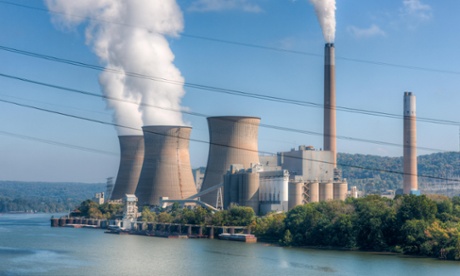
The global energy industry reached a watershed in 2014 as global emphasis on climate change, a slowing Chinese economy and a resurgence in US oil affected fossil fuel producers, according to BP.
The British oil and gas group said global warming was one of three long-term trends that emerged in 2014, as politicians and campaigners prepare for the UN climate change conference in Paris later this year. However, BP said a slowdown in carbon dioxide emissions growth last year may not continue if demand from energy-intensive industries recovers.
Introducing its annual Statistical Review of World Energy, BP’s group chief economist, Spencer Dale, said there had been significant attention placed on fossil fuel reserves amid campaigns, including the Guardian’s Keep it in the Ground series, to mothball oil and gas fields.
“The issue is not whether we will run out of fossil fuels, but rather how we should use those ample reserves in an ample and efficient way,” said Dale.
Dale added that last year was a watershed for the sector due to climate change, China’s slowing growth and a shale-driven boost in US oil and gas production that changed the industry’s balance of power. “In years to come it is possible that 2014 may come to be seen as something of a watershed for the energy industry,” he said.
He added: “Not so much because of the near-term volatility associated with the sharp fall in oil prices and the various adjustments that triggered ... but rather because some of the longer-term trends which are likely to have a huge bearing on the shape of the energy sector over coming years.”
The statistical review estimated that carbon emissions grew 0.5% in 2014, the slowest annual growth for more than15 years, other than in the immediate aftermath of the financial crisis of 2008. The average rate of annual growth recently has been 2%.
BP attributes the slower growth last year to weak global economic activity and warmer weather in the western hemisphere, but also an a reduction in China’s use of fossil fuels, particularly coal for power generation. Beijing has increasingly turned to renewable energy with hydroelectric power increasing almost 16% in 2014.
Dale is not convinced, however, this trend of lower emissions will last. “The 1tn-tonne question is whether these developments in China are likely to persist, so possibly signalling the beginning of a lower trend in emissions growth – or whether they are likely to reverse in the near future,” he said.
“The extent of the slowdown in 2014 also reflected a number of one-off and erratic factors that are unlikely to be repeated and may even get particularly reversed” said Dale, highlighting how unusually low demand from energy intensive industries such as iron, steel and cement could bounce back in future.
BP notes that while coal use in China grew by 0.1% in 2014 compared to 2% 12 months earlier, India showed a very different trend. Coal consumption in India grew by 11% and production by nearly 6.5%.
Meanwhile, BP says that total proved reserves of fossil fuels were unchanged last year at a time when an increasing number of environmentalists and others were arguing they must be left in the ground to stop runaway climate change.
The company, which recently promised to be more open about its climate change strategies, added that proved world oil and gas reserves were now double the level they were in 1980.
“The big picture remains one of abundant reserves with new sources of energy being discovered more quickly than they are consumed. Total proved reserves of oil and gas in 2014 were more than double their level in 1980, when our data began,” said Dale.

